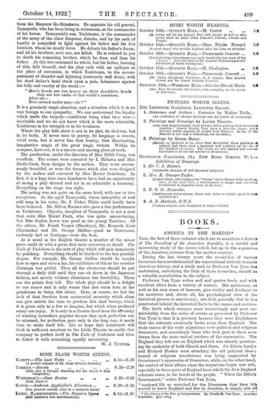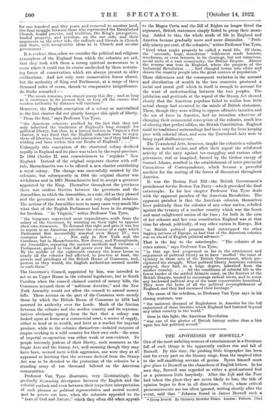BOOKS.
AMERICA IN THE MAKING.*
Tens, the first of three volumes which are to constitute a history of The Founding of the American Republic, is a careful and interesting study of the causes which led up to the separation of the American colonies from the mother country.
During the last twenty years the researches of various historians have revolutionized the conventional attitude towards American history, and a study such as Professor Van Tyne has undertaken, embodying the fruit of these researches, should be a valuable contribution to the subject.
Professor Van Tyne writes well and quotes freely and with excellent effect from a variety of sources. His quotations, as well as his own sense of humour, give reality and liveliness to his narrative and, above all, his psychological view of the historical process is convincing ; one feels generally that he has penetrated behind the historical facts to the causes and motives.
The truth which emerges most interestingly and most un- mistakably from the series of events as presented by Professor Van Tyne is that it is precisely because they were Englishmen that the colonists eventually broke away from England. The main causes of the early migrations were political and religious discontent, and accordingly those who took part in them were drawn from the more radical sections of the community. The England they left was an England which was already question- ing the authority of both Church and State. Sir Edwin Sandys and Richard Hooker were attacking the old political ideas ; hatred of religious interference was being augmented by Government's oppression of Dissenters, while, on the other hand, the control of local affairs when the migrations began was still, especially in those parts of England from which the New England colonists came, in the hands of the people. " When the British Government," writes Professor Van Tyne,
" rendered life so wretched for the Dissenters that 'they felt moved to leave England and flee to America, it simply put off • The Causes of the War of Independence. By Claude H. Tan Tyne. London: Constable. [21s. net.j
for one hundred and fifty years, and removed to another land, the final struggle between those who represented the Established Church, feudal practice, and tradition, the King's prerogative, landed property, and privilege, on the one side, and their opponents on the other side, the radicals and liberals in Church and State, with antagonistic ideas as to Church and secular government."
It is evident, then, when we consider the political and religious atmosphere of the England from which the colonists set sail, that they took with them a strong spiritual momentum to a scene where it could run its course unchecked by those restrain- ing forces of conservatism which are always present in older civilizations. And not only were conservative forces absent, but the authority of King and Parliament, at a range of three thousand miles of ocean, shrank to comparative insignificance.
As Burke remarked :— " The ocean remains, you cannot pump this dry ; and so long as it continues in its present bed, so long all the causes that weaken authority by distance will continue."
Moreover, the English conception of a colony as materialized in the first charter did not greatly hamper this spirit of liberty.
From the first," says Professor Van Tyne, " the American colonists profited by the fact that they not only inherited the traditions of England's long struggle for political liberty, but that, in a formal fashion in Virginia's first charter, it was fixed that the English colonists were to enjoy there all liberties, franchises, and immunities as if they had been abiding and born within this our Realm of England.' . . ."
Unhappily this conception of the chartered colony declined rapidly in England and its place was taken by the royal province. In 1664 Charles IL sent commissioners to " regulate " New
England. Instead of the original corporate charter with self- rule, Massachusetts was to be offered a new charter establishing
a royal colony. The change was successfully resisted by the colonists, but subsequently in 1684 the original charter was withdrawn and in 1691 Massachusetts had to accept a governor appointed by the King. Thereafter throughout the provinces there was endless friction between the governors and the Assemblies, in which the Assemblies, as a rule, did as they pleased and the governors were left in a not very dignified isolation.
The actions of the Assemblies were in many cases very much like what that of the English Parliament had been in its struggles for freedom. " In Virginia," writes Professor Van Tyne,
" the burgesses supervised most expenditures, aside from the salary of the Governor, by insisting on their right to appoint their own treasurers. To demand this right and gain it was but to repeat in an American province the exercise of a right which Parliament first successfully asserted over Henry IV., two centuries before. . . . Not only in New York and the Carolinas, but in Massachusetts, New Jersey, and Pennsylvania, the Assemblies, repeating the ancient methods and victories of Parliament, gained in time full power over the finances. . . . By the middle of the eighteenth century the lower house in nearly all the colonies had affected, in practice at least, the powers and privileges of the British House of Commons, and, protest as they would, the English authorities seemed unable to curb them."
The Governor's Council, appointed by him, was intended to act as an Upper House in the colonial legislature, but in South Carolina when the council claimed control of money bills, the Commons accused them of "seditious doctrine," and the New York Assembly would not allow the council to amend money bills. These actions on the part of the Commons were merely those by which the British House of Commons in 1678 had asserted its authority over the Lords. Much of the friction between the colonies and the mother country and its represen- tatives obviously sprang from the fact that a colony was looked upon at home as a commercial asset, a source of supply, either in kind or in wealth, and later as a market for imperial produce, while in the colonies themselves—isolated outposts of empire working in a wild country for their own ends—the sense of imperial co-operation was either weak or non-existent. To people intensely jealous of their liberty, such measures as the Sugar Acts and the Stamp Act, well-meaning though they may have been, seemed mere selfish aggression, nor were they at all appeased at learning that the revenue derived from the Stamp Act was to be devoted to the protection of the colonies by a standing army of ten thousand billeted on the American communities.
Professor Van. Tyne illustrates, very illuminatingly, the gradually ir ',reasing divergence between the English and the
colonial outlook and even between their respective interpretation of soach phrases as political representation and central control, and he points out how, when the colonists appealed to the ' laws of God and Nature," which they often did when appeals
to the Magna Carta and the Bill of Rights no longer fitted the argument, British statesmen simply failed to grasp their mean- ing. Added to this, the whole mode of life in England and America became gradually more and more dissimilar. " Prob- ably ninety per cent. of the colonists," writes Professor Van Tyne, " lived what might properly be called a rural life. Of them, the uncouth, huge, monstrous ' wilderness made hunters, woodsmen, or even farmers, in its clearings, but not conscious, social units of a vast community, the British Empire. Almost the reverse was true in England, where the progress of the Industrial Revolution . . . had changed towns into cities and drawn the country people into the great centres of population."
These differences and the consequent variation in the amount and distribution of wealth in the two countries produced a social and moral gulf which in itself is enough to account for the want of understanding between the two peoples. Tho jubilation and gratitude at the repeal of the Stamp Act showed clearly that the American populace failed to realize how little actual change had occurred in the minds of British statesmen. These, though they were willing to oppose offensive taxation and the use of force in America, had no intention whatever of changing their commercial conception of the colonies, much less of altering that perfect edifice, the British Constitution. England - amid its traditional surroundings had been very far from keeping pace with colonial ideas, and soon the Townshend Acts were to bring rapid disillusionment.
The Townshend Acts, however, taught the colonists a valuable lesson in united action, and after their repeal the reinforced activity of the navy against tea-smuggling and various other grievances, real or imagined, fanned by the tireless energy of Samuel Adams, resulted in the establishment of inter-provincial Committees of Correspondence, which became a powerful machine for the uniting of the forces of discontent throughout America.
It was the Boston Port Bill—the British Government's punishment for the Boston Tea Party—which provoked the final catastrophe. In his last chapter Professor Van Tyne deals with the apparent paradox of the American Revolution. Tho apparent paradox is that the American colonies, themselves freer politically than the colonies of any other nation, rebelled against the tyranny of a mother country which was the freest and most enlightened nation of the time ; for both in the case of her colonies and her own constitution England was at that time far ahead, politically, of any other nation in Europe. But " as British political progress had outstripped the other lagging nations of Europe, so had that of the American colonies run on ahead of English political advance."
That is the key to the catastrophe. " The colonies of no
other nation," says Professor Van Tyne,
" in that age had progressed so far in the attainment and enjoyment of political liberty as to have snuffed ' the taint of tyranny in those acts of the British Government, which pre- cipitated the struggle. What political liberty American colonies enjoyed, they had, in a large degree, inherited from the mother country.. . . All the conditions of colonial life in the forest border of the settled Atlantic coast, on the frontier of the British Empire, tended to encourage radical views, and to resist any backward political step of the more conservative homeland. They were the heirs of all the political accomplishment of England, and they had increased their heritage."
The cause of the rebellion, as Professor Van Tyne says in his closing sentence, was " the insistent demand of Englishmen in America for the full enjoyment of those liberties which England had fostered beyond any other country in the world."
Seen in this light, the American Revolution " was cne of the glories of British history rather than a blot upon her fair political record."



































 Previous page
Previous page